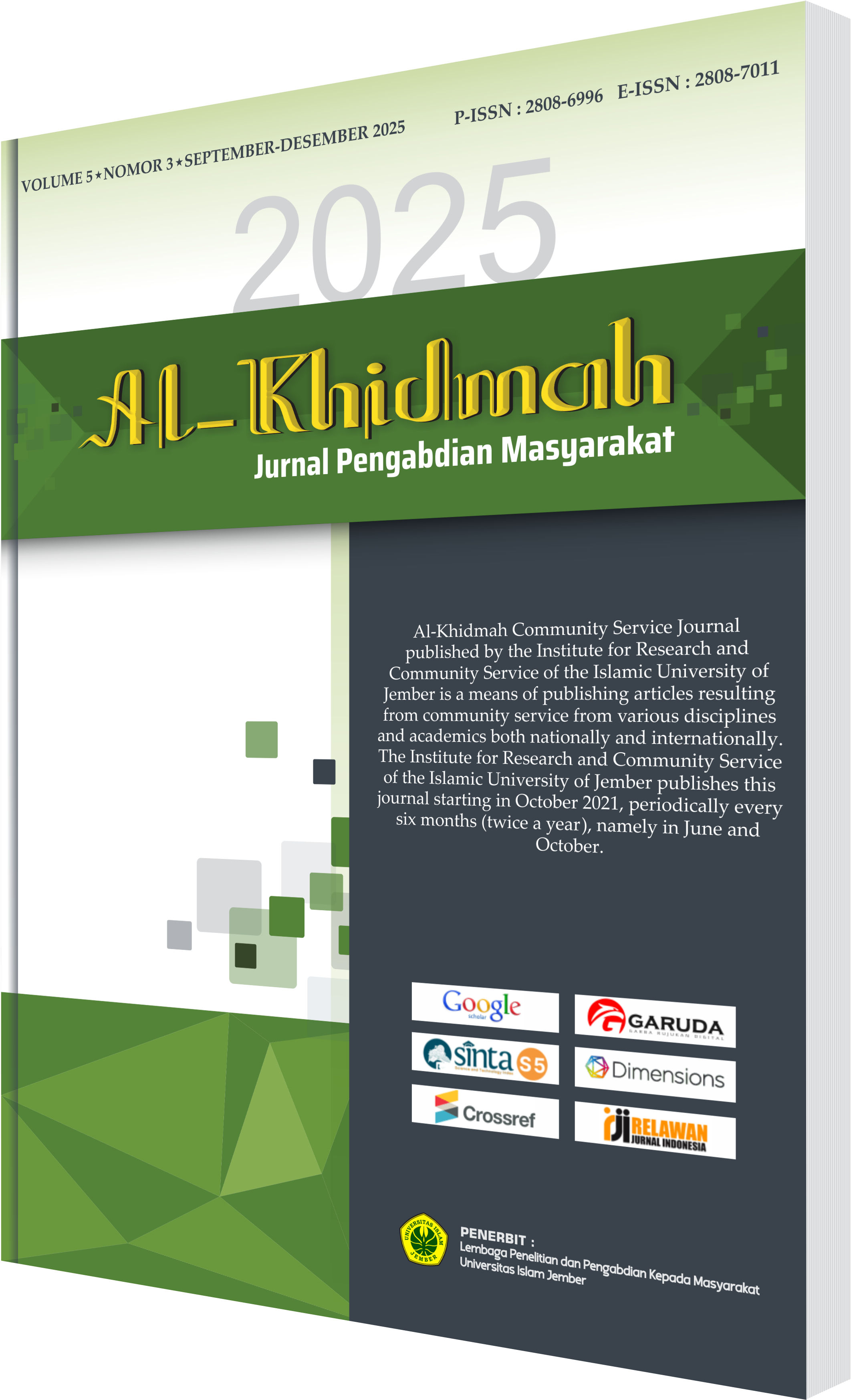Peningkatan Literasi dan Pembentukan Karakter Sosial Melalui Pendekatan Masyarakat di Desa Cibatu Kabupaten Garut
DOI:
https://doi.org/10.56013/jak.v5i3.4720Keywords:
Literacy; Character; Social; Community; Spirituality; IntroductionAbstract
The community approach is an effort to provide relevant education and socialisation to a homogeneous community. There are two efforts that must be made to the community in the midst of uncertain times, namely increasing community literacy and shaping social character. Literacy is an important part of developing community insight and knowledge. Social character is the basis for building networks and caring for one another. These two efforts were carried out by the community service group of the Faculty of Tarbiyah and Teacher Training, Islamic University of Bandung, through a community-based approach in Cibatu Village, Garut Regency. The aim of the activity was to improve literacy and shape social character through a community-based approach. The methods used in the implementation of the activity were interaction-based mentoring and socialisation. The steps taken were: 1) Identifying problems; 2) Planning activities and materials; 3) Coordinating activities; 4) Conducting socialisation; 5) Mentoring; 6) Monitoring and evaluation; and 7) Following up on the programme and documentation. The results of the activities show that the community is interested in improving literacy by reading books and responding to current issues with an objective perspective. Likewise, social character has been formed in relation to maintaining family relationships, caring for the environment, positive communication patterns, and spiritual attitudes in daily life.
Downloads
References
Agustino, H. (2019). Pemberdayaan Masyarakat Berbasis Gerakan Literasi di Taman Baca Masyarakat Pondok Sinau Lentera Anak Nusantara. Jurnal Sosial Politik, 5(1), 142.
Andiriyanto, A., Suharyanto, D. F., & Rasaili, W. (2024). Strategi Kebijakan Pendidikan Literasi Dalam Mengurangi Kesenjangan Pembelajaran Di Wilayah Pedesaan Kabupaten Sumenep. NUSANTARA: Jurnal Ilmu Pengetahuan Sosial, 11(7), 2991–3000. https://doi.org/10.31604/jips.v11i7.2024.2991-3000
Brannon, T. N., Fisher, P. H., & Greydanus, A. J. (2020). Selves as Solutions to Social Inequalities: Why Engaging the Full Complexity of Social Identities is Critical to Addressing Disparities (1 ed.). Cambridge University Press. https://doi.org/10.1017/9781108874267
Cisneros-Montemayor, A. M., Moreno-Báez, M., Voyer, M., Allison, E. H., Cheung, W. W. L., Hessing-Lewis, M., Oyinlola, M. A., Singh, G. G., Swartz, W., & Ota, Y. (2019). Social equity and benefits as the nexus of a transformative Blue Economy: A sectoral review of implications. Marine Policy, 109, 103702. https://doi.org/10.1016/j.marpol.2019.103702
Hadiputra, Y. L. (2021). Kualitas Orang Sukses. PBMR ANDI.
Junnatussadiah, B., & Muhammad, G. (2025). Pengaruh Media Pembelajaran Digital Untuk Meningkatkan Sikap Spiritual dan Sosial Siswa Kelas V SD Mathlaul Khoeriyah Bandung. Jurnal Riset Pendidikan Agama Islam, 57–64. https://doi.org/10.29313/jrpai.v5i1.6657
Kalla Institute. (2024, Februari 1). Rendahnya Minat Literasi di Indonesia. kallainstitute.ac.id. https://kallainstitute.ac.id/rendahnya-minat-literasi-di-indonesia/
Komdigi. (2020, Agustus 26). Teknologi Masyarakat Indonesia: Malas Baca Tapi Cerewet di Medsos. www.komdigi.go.id. https://www.komdigi.go.id/berita/pengumuman/detail/teknologi-masyarakat-indonesia-malas-baca-tapi-cerewet-di-medsos
McManus, J. F., & Carvalho, S. W. (2022). Consumers’ love for technological gadgets is linked to personal growth. Personality and Individual Differences, 194, 111637. https://doi.org/10.1016/j.paid.2022.111637
Muhammad, G., Nurhakim, H. Q., Rifaldi, M., & Pamungkas, M. I. (2024). Pencegahan Perundungan pada Peserta Didik Melalui Elemen Berkebhinekaan Global Profil Pelajar Pancasila. At Turots: Jurnal Pendidikan Islam, 177–188. https://doi.org/10.51468/jpi.v6i1.483
Muhammad, G., Rahmawati, S., Saepudin, A., & Suhardini, A. D. (2024). Meningkatkan Motivasi Belajar Siswa Sekolah Dasar Menggunakan Media Smart Box Pada Mata Pelajaran Pai. Pendas: Jurnal Ilmiah Pendidikan Dasar, 9(04), 231–245.
Muhammad, G., Rozali, Z. P., & Erhamwilda, E. (2025). Pengetahuan Akhlak Sosial Sebagai Upaya Mencegah Tindakan Perundungan di Sekolah. Al-Qalam: Jurnal Kajian Islam dan Pendidikan, 17(1), 12–23. https://doi.org/10.47435/al-qalam.v17i1.3490
Muhammad, G., Ruswandi, U., Nurmila, N., & Zakiyah, Q. Y. (2023). Implementation of Multicultural Values through the Hidden Curriculum of PAI Subjects in Forming a Peace-loving Character in Junior High Schools. European Journal of Education and Pedagogy, 4(6), 113–120. https://doi.org/10.24018/ejedu.2023.4.6.768
Muhammad, G., Taja, N., Rosenda, D., & Pamungkas, M. I. (2025). Peace education as a base for introducing multicultural society to students. AL-TARBIYAH: Jurnal Pendidikan (The Educational Journal), 34(2), 112. https://doi.org/10.24235/ath.v34i2.18596
Novrizaldi. (2022, Oktober 6). Indonesia Emas 2045 Diwujudkan Oleh Generasi Muda. kemenkopmk.go.id. https://www.kemenkopmk.go.id/indonesia-emas-2045-diwujudkan-oleh-generasi-muda
Pau, A. I. K. (2025, April 6). Indonesia Urutan ke-2 Angka Kriminalitas Tertinggi di ASEAN. rri.co.id. https://rri.co.id/hukum/1434993/indonesia-urutan-ke-2-angka-kriminalitas-tertinggi-di-asean
Ryan, R. M., & Deci, E. L. (2000). Self-determination theory and the facilitation of intrinsic motivation, social development, and well-being. American Psychologist, 55(1), 68–78. https://doi.org/10.1037/0003-066X.55.1.68
Sanusi, I., Suhartini, A., Nurhakim, H. Q., Nur’aeni, U., & Muhammad, G. (2024). Konsep Uswah Hasanah dalam Pendidikan Islam. Masagi: Jurnal Pendidikan Karakter, 1(1), 1–20. https://doi.org/10.29313/masagi.v1i1.3523
Sholihah, S. A., & Khoiriyah, K. (2024). Literasi Keagamaan sebagai Pondasi Pengembangan Karakter Religius Siswa. Al-Fikri: Jurnal Studi dan Penelitian Pendidikan Islam, 7(2), 19. https://doi.org/10.30659/jspi.7.2.19-39
Sopian, H. (2025). Literasi di Lereng Rinjani: Membangun Harapan Anak Pedalaman. Selat Media.
Suhara, A., & Mayasari, N. (2025). Metode Pengabdian kepada Masyarakat Teori dan Praktik. Penerbit Widina.
Surana, D., Muhammad, G., Sanusi, I., Nurhakim, H. Q., & Pamungkas, M. I. (2024). The Effect of Dhuha Prayer Habituation on the Awareness of Performing Fard Prayers among Madrasah Ibtidaiyah Students. MUDARRISA: Jurnal Kajian Pendidikan Islam, 16(2), 226–247. https://doi.org/10.18326/mudarrisa.v16i2.2582
Taja, N., Muhammad, G., Fawzi, R., & Elmuna, L. (2024). Nilai Syumuliyah, Kafa’ah Dan Tasamuh Dalam Tafsir Surat Al-Hujurat Ayat 13. Al Burhan: Jurnal Kajian Ilmu dan Pengembangan Budaya Al-Qur’an, 24(1), 48–66.
Verplanken, B., & Orbell, S. (2022). Attitudes, Habits, and Behavior Change. Annual Review of Psychology, 73(1), 327–352. https://doi.org/10.1146/annurev-psych-020821-011744
Downloads
Published
How to Cite
Issue
Section
License
Copyright (c) 2025 Giantomi Muhammad, Aep Saepudin, Muhamad Aldi, Lia Yulistia Dewi Wibowo, Dika Purnama, Nutfah Ayu Syahrani, Dariah Meilana

This work is licensed under a Creative Commons Attribution-ShareAlike 4.0 International License.





